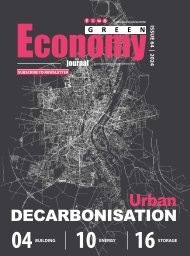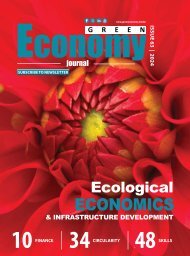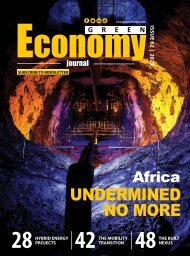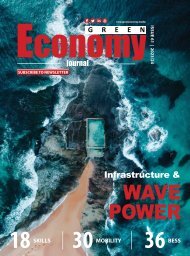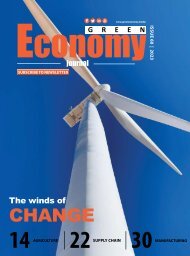Green Economy Journal Issue 48
Create successful ePaper yourself
Turn your PDF publications into a flip-book with our unique Google optimized e-Paper software.
RESPONSIBLE INVESTING<br />
RESPONSIBLE INVESTING<br />
Financing a<br />
SUSTAINABLE ECONOMY<br />
Sustainable finance plays a pivotal role in enabling environmentally appropriate social<br />
development and creating new economic opportunities in the green economy.<br />
Treasury seeks to protect the economy and unlock opportunities that will<br />
enhance the country’s adaptability to the rapidly changing climate and<br />
realise socio-economic benefits from the transition to a lower carbon, greener<br />
economy and build resilience to create a safer financial sector that better<br />
serves South Africa. It is pursuing policies to ensure all financial institutions<br />
embed and improve their capability for identifying, managing and disclosing<br />
the environmental and social risks in their portfolios through strengthening<br />
the regulatory framework and encouraging the uptake of leading practice.<br />
Treasury capital appraisal guidelines, which are under review, will<br />
incorporate climate resilience. Fiscal allocations to support ecologically<br />
sustainable development through the Department of Environmental<br />
Affairs, Forestry and Fisheries are complemented with funding for public<br />
transport, clean energy and energy efficiency, water conservation and<br />
demand management.<br />
At an intergovernmental level, the Treasury approach is to integrate<br />
climate responsiveness into provincial and municipal planning. This<br />
includes ensuring climate change responsive budgeting through<br />
guidelines for provincial medium-term expenditure frameworks and<br />
built environment performance plans for metropolitan municipalities.<br />
Through a progressive integration and system reform, provinces and<br />
municipalities can create an intergovernmental project pipeline.<br />
Accelerating the implementation of the 2015 Paris Climate Agreement<br />
requires clear financing strategies that work to mobilise resources<br />
from both public and private sectors. Treasury is working with local<br />
and international partners to leverage climate change funding. The<br />
Department of Agriculture and Treasury is working closely with the local<br />
insurance industry on an agricultural insurance product.<br />
*Excerpt from Financing a Sustainable <strong>Economy</strong> report<br />
The South African national greenhouse gas inventory highlights<br />
that electricity generation from fossil fuels contributes some 45%<br />
of South African emissions. It follows, therefore, that to address<br />
climate-related risks in the country it is essential to reduce electricityrelated<br />
emissions. The scale and reach of this problem is multifaceted<br />
and requires financial resources, structural and socio-economic reforms.<br />
Sustainable finance is essential for balanced and inclusive growth,<br />
based on the identification and mitigation of risks as well as the search<br />
for economic opportunities that are socially, environmentally and<br />
economically beneficial. It encompasses both the concepts of green- and<br />
socially-focused finance.<br />
The Intergovernmental Panel on Climate Change, the OECD and others<br />
have estimated that trillions of new dollars will be needed each year, up to<br />
2030, for investments in energy, transport, water and telecommunications<br />
infrastructure to sustain growth and mitigate climate effects. An additional<br />
USD600bn a year would likely be needed to make these investments<br />
compatible with holding the average global warming to 2°C.<br />
The Climate Policy Initiative1 has estimated the South African economic<br />
transition risks at an aggregated R2tn (of which 60% has already been<br />
incurred) 2 . A further R362bn may result from infrastructure investments<br />
currently being contemplated that may not be economically viable in a<br />
low-carbon transition. Many of the transition risks identified result from<br />
transitions in the global economy and cannot be prevented by any national<br />
government but require rapid adaptation by all players public and private.<br />
In 2017, the Task Force on Climate-related Financial Disclosures3 published<br />
recommendations to increase understanding of the financial risks related<br />
to climate change. It recommended to the G20 that for financial disclosure,<br />
global warming scenarios should be used to model the potential risks to<br />
economic systems. Systematic and credible disclosure is needed to enable<br />
improved pricing and risk distribution and the identification of economic<br />
opportunities associated with climate risk mitigation and adaptation.<br />
TREASURY APPROACH<br />
Addressing both climate change and South Africa’s development agenda<br />
will require the reallocation of capital, the mobilisation of new financial<br />
resources and the strategic realignment of existing resources (public and<br />
private) over the short, medium and long term.<br />
Government has recognised the need for a just transition4 and<br />
various government agencies and departments, including Treasury and<br />
the National Planning Commission, are working to understand what<br />
is needed and stimulate the creation of new jobs. By mobilising private<br />
sector funding of new and more sustainable projects, such as through the<br />
Renewable Energy Independent Power Producer Programme (REIPPP),<br />
Treasury facilitates the shifting of green infrastructure investment off the<br />
national balance sheet into the private sector.5<br />
The Climate Policy Initiative<br />
has estimated the South African<br />
economic transition risks at<br />
an aggregated R2tn.<br />
READ REPORT<br />
[ECO]NOMIC THOUGHT<br />
greeneconomy/the upshot<br />
Environmental<br />
and social<br />
risks and<br />
opportunities<br />
FINANCING A SUSTAINABLE ECONOMY | National Treasury<br />
Technical Report [2020]<br />
This paper sets out the research and resultant recommendations of a process to establish<br />
minimum practice and standards about climate change as well as emerging environmental<br />
and social risks. The study focuses on the need for South Africa to mobilise the financial<br />
resources now to address this challenge, both for the benefit of its citizens and to meet its<br />
global obligations.<br />
REPORT RECOMMENDATIONS<br />
To adopt the following definition of sustainable finance in South Africa:<br />
Sustainable finance encompasses financial models, products, markets and ethical<br />
practices to deliver resilience and long-term value in each of the economic,<br />
environmental and social aspects and thereby contribute to the delivery of the<br />
sustainable development goals and climate resilience.<br />
This can be achieved by:<br />
• Evaluating portfolio as well as transaction-level environmental and social risk exposure and<br />
opportunities, using science-based methodologies and best-practice norms<br />
• Linking these to products, activities and capital allocations<br />
• Maximising opportunities to mitigate risk and achieve benefits in each of the social and<br />
environmental and economic aspects<br />
• Contributing to the delivery of the sustainable development goals.<br />
08 09 11 16 49<br />
SA’s climate<br />
change<br />
response<br />
Barriers to<br />
sustainable<br />
finance<br />
Defining<br />
sustainable<br />
finance<br />
Conclusion<br />
of report<br />
WATCH NOW<br />
12<br />
[ECO]NOMIC THOUGHT<br />
greeneconomy/watch<br />
DEVELOPMENT DIALOGUE | A Trade<br />
& Industrial Policy Strategies seminaar on<br />
the key priorities and challenges for a just<br />
transition in Emalaheni and Steve Tshwete –<br />
What does mining closure mean for workers,<br />
their jobs and livelihoods? [August 2021]<br />
REFERENCES<br />
1 Climate Policy Initiative: https://climatepolicyinitiative.org<br />
2 USD125bn at January 2019 exchange rates<br />
3 Established by the Financial Stability Board at the request of the G20 finance ministers and central banks<br />
4 Just transition accommodates the needs of communities, which may be negatively affected through the loss of jobs or activities because of a move to a lower carbon economy<br />
5 Eskom power purchase agreements are an exception<br />
SOUTH AFRICA’S GREENEST BONDS<br />
The earliest green bonds issued in South Africa were for clean energy infrastructure and local government initiatives:<br />
2012 The Industrial Development Corporation issued a R5bn bond for investment in clean energy infrastructure.<br />
2014 The City of Johannesburg was the first local municipality to list a green bond on the JSE – a R1.46bn issuance to finance initiatives, such<br />
as biogas-to-energy and the Solar Geyser Initiative. The City of Cape Town’s R1bn <strong>Green</strong> Bond will fund projects aligned with the City’s<br />
Climate Change Strategy, including measures to secure long-term water availability.<br />
2017 The Johannesburg Stock Exchange opened a <strong>Green</strong> Bond segment on the exchange. The first bond issuance, by Growthpoint, was a<br />
R1.1bn bond for five, seven or 10 years.<br />
2019 Nedbank became the first bank to list a green bond on the JSE, with proceeds ring-fenced for renewable energy. It attracted R5.5bn in bids<br />
and increased the size of the issue from R1bn to R1.7bn.<br />
2020 Standard Bank sold a 10-year USD200m green bond to the International Finance Corporation via the London Stock Exchange.<br />
13




